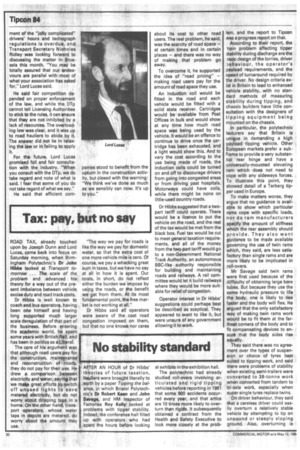Tax: pay, but no say
Page 32

If you've noticed an error in this article please click here to report it so we can fix it.
ROAD TAX, already touched upon by Joseph Dunn and Lord Lucas, came back into focus on Saturday morning, when Birmingham Polytechnic's Dr John Hibbs looked at Transport tomorrow . .. The scale of the problem and advanced his theory for a way out of the present imbalance between vehicle excise duty and road track costs.
Dr Hibbs is well known to coach and bus operators, having been one himself and having long supported much larger scale deregulation of that part of the business. Before entering the academic world, he spent some years with British Roll, and has been in politics as a Liberaf.
The core of his argument was that although road users pay for the construction, maintenance and reconstruction of road, they do not pay for their use. He drew a comparison between electricity and water, sayirke that we make great efforts pswitch off unused lights to save metered etectricity, but do not worry about dripping taps in a home. On the other hand, transport operators, whose water taps in depots are metered, do worry about the amount they use. "The way we pay for roads is like the way we pay for domestic water, so that the extra cost of one more vehicle mile is zero. Of course, we pay a whacking great sum in taxes, but we have no say at all in how it is spent. Our costs, in short, do not reflect either the burden we impose by using the roads, or the benefit we get from them. At its most fundamental point, the free market is not working at all."
Dr Hibbs said all operators were aware of the cost road congestion imposed on them, but that no one knows nor cares












































































































